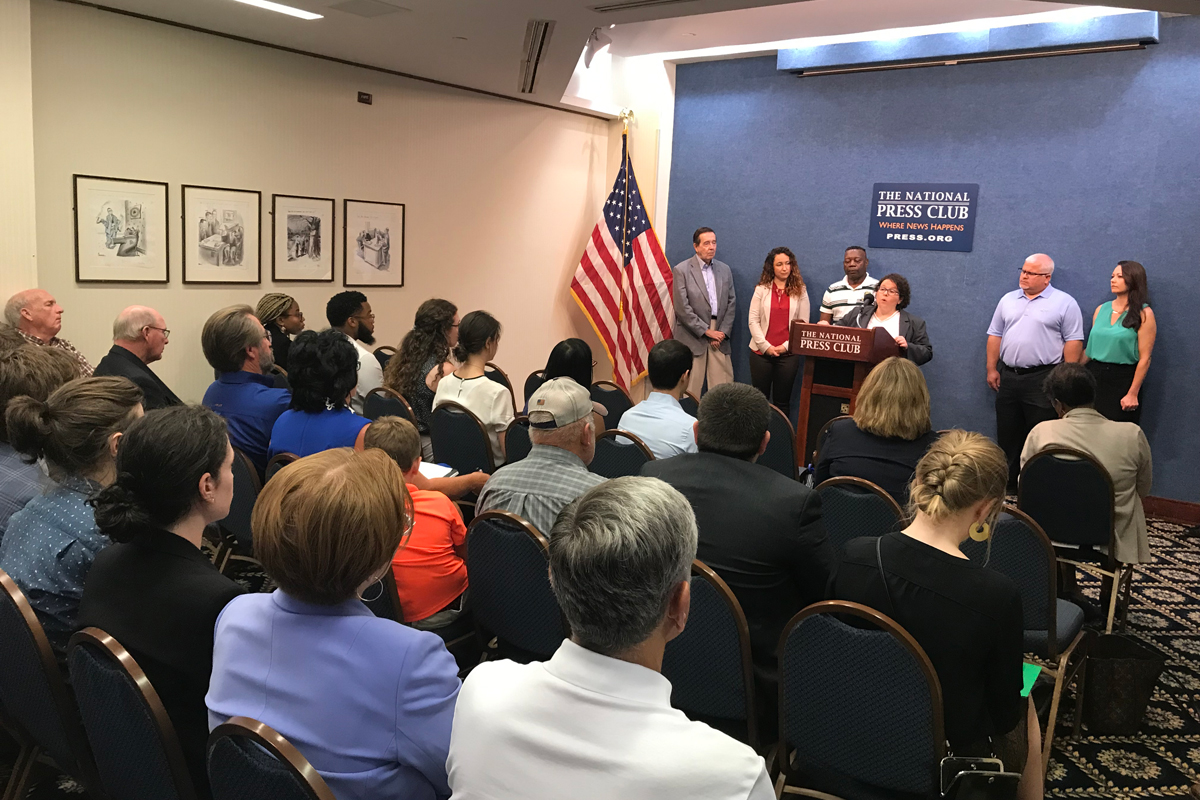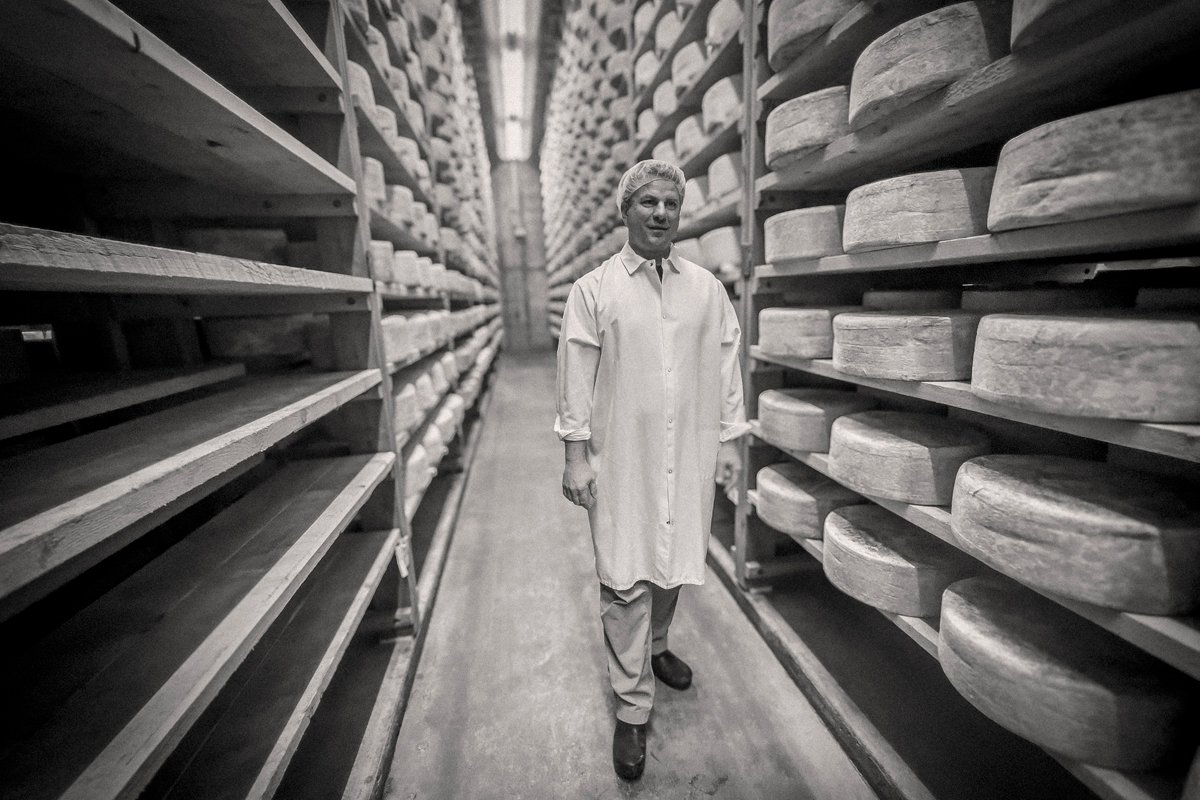Saying they’ve endured years of unfair contracts, discrimination, and retaliation from a handful of big companies that control the industry, farmers and ranchers are asking USDA to enforce the GIPSA rules.

Saying they’ve endured years of unfair contracts, discrimination, and retaliation from a handful of big companies that control the industry, farmers and ranchers are asking USDA to enforce the GIPSA rules.
July 19, 2019

Carlton Sanders started a job he truly loved—raising chickens—in 1991 in Forest, Mississippi. In 2001, the small company he sold his chickens to was bought by agribusiness giant Koch Foods, and everything changed. “They treated me like a slave,” he said. Sanders, who is Black, says Koch Foods drove him out of business with discriminatory practices, many of which are documented in a recent ProPublica investigation.
As he described his 2017 foreclosure hearing, he struggled to hold back tears. The judge asked if he’d be able to vacate his farm within 16 days. “I said, ‘It’s not enough [time], but I’m just tired. I’ll burn up the rest of it, or they can have it.”

Carlton Sanders outside the office of Rep. Cindy Hyde-Smith (R-Miss.). (Photo credit: RAFI-USA)
Sanders was one of several poultry, hog, and cattle farmers gathered in Washington, D.C., this week to speak out about the imbalance of power in the meatpacking industry, which allows a few large companies to post sizable profits while many growers struggle with debt.
A law aimed at ensuring that small and mid-size meat producers can compete against larger players, called the Packers and Stockyards Act, has been on the books since 1921. But after nearly 100 years, the United States Department of Agriculture (USDA) still does not have rules in place that would give the agency the power to effectively enforce many components of the law. Meanwhile, continuing consolidation in animal agribusiness has tipped the power imbalance even further.
According to a recent report from the advocacy group Open Markets Institute, the four largest poultry processing companies—Tyson, Pilgrim’s Pride, Sanderson Farms, and Perdue—controlled more than 50 percent of the market in 2015 compared to 35 percent in 1986, and nearly 75 percent of contract poultry growers live below the poverty line. The four largest beef-packing companies captured 85 percent of the market in 2015, compared to 25 percent in 1977.
In D.C., growers and advocates launched the “Stand With Farm Families” Campaign to draw attention to the issues they face when up against that kind of consolidated power, at a moment in time when the USDA is set to release new rulemaking related to the Packers and Stockyards Act. A Change.org petition launched at the event already has more than 60,000 signatures.
“We are here today because right now the USDA has an opportunity to fix some of what is so wrong in this industry, by creating rules that would provide basic protections and level the playing field, so farmers have a fighting chance,” said Sally Lee, of the Rural Advancement Foundation International (RAFI-USA).
However, it remains unclear whether the new rule will have any real teeth—if it ever gets finalized.
In 1992, Craig Watts a farmer in Fairmont, North Carolina, was excited by the money to be made raising chickens for Perdue. “It was the numbers that they brought me, the hooks to get me in the business,” he said. “You’re going to make this much money, you’re going to pay out in 10 years, you’re going to do this, you’re going to do that.”
Watts said he initially spent $200,000 to build two poultry houses. Two years later, he invested another $200,000 to build two more. Much later, he was taken aback when the company required him to spent about $200,000 to make barn upgrades, and it became clear his future would be about running on a “treadmill of debt,” he said. “The best place I can figure those [profit] numbers came from was fantasyland. What we wound up doing was just barely eking by, paying down debts, and just grinding it out, day by day—and that’s not really what I signed up for.”
Watts is a long-time whistleblower, but many aspects of his story are common among contract poultry growers, since companies require them to make significant up-front investments and “upgrades,” often without warning, related to things like bigger fans or new feeders. Certain upgrades related to fitting more chickens into barns also upset Watts from an animal welfare perspective. “They went to solid walls,” he said. “So you had a dusty, dark, filthy shed that you were cramming birds in.”
If growers don’t have the income at a given moment to make the sudden upgrades, the outcome is simple, Sanders said. “[The company says], ‘No more chickens. Call us when you do.’”
Companies are able to do that because they own the animals and the feed. That gives them a particular kind of power, because they pay growers based on how efficiently they can fatten the chickens compared to other growers in their region in a “tournament system” that is designed to pay the top producers significantly more than the others. Since the main factors that influence production efficiency (quality of the chicks and feed) are controlled by the company, some farmers say that companies can discriminate or retaliate against growers who complain by sending lower quality chicks and feed.
“We don’t have control over which farms we sell against. We don’t have control over our inputs,” said Greg Carey, who has been raising poultry in Lawrenceville, Georgia since 2000. Carey said as a result of the payment system, his checks for a flock can vary by as much as $15,000. “How many other companies are there in America where you don’t know what you’re going to make at the end of a job?” (Costco, for one, has said it will do away with the tournament system within the massive chicken supply chain it’s building in Nebraska.)

Greg Carey (Photo credit: Marcello Capellazzi)
Carey got a letter from his lender, Farm Credit, last year notifying him of foreclosure, and he estimates his current debts are north of $250,000. He still has one poultry house up and running, but wouldn’t disclose the company he’s selling to for fear of retaliation. “So, this is what we have to show for 20 years of work,” he said.
Preventing companies from retaliating against growers who speak out about unfair practices is one of the main issues a new USDA rule is expected to address, and it would be decades in the making.
While the Packers and Stockyards Act was passed in 1921, USDA rulemaking didn’t start until 2008, when that year’s farm bill directed the agency to establish rules under which the law could be enforced. In 2010, the USDA came up with proposed rules after soliciting public input via listening sessions and more than 60,000 comments. Those rules are often referred to as the GIPSA rules, for the Grain Inspection, Packers and Stockyards Administration that was set up to administer them. However, they were subsequently delayed and never finalized, due to various reversals and riders.
In 2016, the Obama administration made a last-ditch effort to move them forward again. However, President Trump took office soon after, and his administration withdrew the rules and also dissolved GIPSA, shifting enforcement of the Packers and Stockyards Act to USDA’s Agricultural Marketing Service.
Over the years, industry groups including the National Cattlemen’s Beef Association and the National Chicken Council have lobbied against the proposed GIPSA rules, calling them “government intrusion in the free market” and claiming the rules would raise costs and stifle innovation.
“We believe Packers and Stockyards needs better enforcement, and we recognize that the consolidation of the industry has been running rampant. The more consolidation, the fewer options farmers have,” said Jake Davis, of Family Farm Action. “The real background is that lawmakers in 1921 knew that the federal government had an important role to play when it came to ensuring that the big meatpackers don’t engage in practices like undue preference.”
“At a basic level, [undue preference] means actions of the company that would give preference to one grower over another,” explained National Sustainable Agriculture Coalition (NSAC) policy specialist Candace Spencer, like giving certain farmers lower quality feed in retaliation for expressing concerns.
Undue preference is the rule that’s currently on the table. At the end of 2017, the Organization for Competitive Markets (OCM) sued the USDA for not enforcing the 2008 Farm Bill directive related to Packers and Stockyards, and while the court ultimately sided with the USDA, the agency promised to crack down on the law’s prohibition on undue preference.
The proposed rule is currently being reviewed by the U.S. Office of Management and Budget and is expected to be posted for public comment later this summer, but advocates and farmers are using the moment to call attention to the overall lack of power they have in the industry. “This is a matter of wanting to take action and make our voices heard,” Spencer said.
Given the law’s long history of rules sitting in limbo, it’s hard to know whether the current USDA will finally move them forward.
Still, farmers Sanders, Watts, and Carey left for their next meeting with Senator Jon Tester (D-Montana) with an eye toward change. Senator Tester and Representative Marcy Kaptur (D-Ohio) are now asking fellow legislators to sign onto a draft letter supporting new USDA rules related to the Packers and Stockyards Act that would prioritize small farmers’ concerns. According to Politico, Representative Chellie Pingree (D-Maine) and Senator Chuck Grassley (R-Iowa) have signed on so far.
“I’m here 10 years later doing the exact same thing I was doing in 2008 because nothing’s ever been cleared up and nothing’s ever really been done,” said Watts. “If you’re a poultry farmer, you’re an eternal optimist. You always hope tomorrow’s going to be better.”

September 4, 2024
By paying top dollar for milk and sourcing within 15 miles of its creamery, Jasper Hill supports an entire community.
September 3, 2024

August 27, 2024

August 26, 2024

August 13, 2024

Like the story?
Join the conversation.